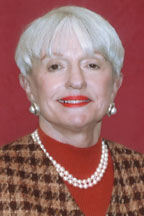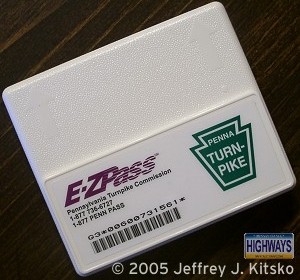Sally Susman Says She Got No Advance Info on the Toll Increase from her Husband
 That's the very interesting question posed by West Virginians for a Republican Majority after yesterday's unanimous vote by the Parkways, Economic Development, and Tourism Authority to raise tolls on the West Virginia Turnpike by more than 60%.
That's the very interesting question posed by West Virginians for a Republican Majority after yesterday's unanimous vote by the Parkways, Economic Development, and Tourism Authority to raise tolls on the West Virginia Turnpike by more than 60%.
 This question would not normally occur had Susman's wife, Delegate Sally Susman, D-Raleigh and candidate for the state Senate, not publicly excoriated the decision almost as soon as it was announced. Alan Susman, a former state senator and current Raleigh County Democratic Chairman, has been on the Turnpike board since his departure from the state Senate in 1978 and wields tremendous influence over his fellow board members.
This question would not normally occur had Susman's wife, Delegate Sally Susman, D-Raleigh and candidate for the state Senate, not publicly excoriated the decision almost as soon as it was announced. Alan Susman, a former state senator and current Raleigh County Democratic Chairman, has been on the Turnpike board since his departure from the state Senate in 1978 and wields tremendous influence over his fellow board members.
Sorry, Sally, you're fooling no one.
It will be a merry Christmas and very happy New Year for the West Virginia Turnpike, but not so for those who travel it. Today, the West Virginia Parkways, Economic Development, and Tourism Authority raised tolls for each of the 3 mainline toll plazas from $1.25 to $2 for cars and from $4.25 to $7 for tractor-trailers. Rates for commuter passes will remain unchanged.
The West Virginia Turnpike, like most other toll roads, is not financed by gas tax dollars but instead by the tolls paid by users. One exception occurred when federal funds subsidized the $700 million widening of the West Virginia Turnpike from 2 lanes to 4 lanes between 1973 and 1989. The West Virginia Turnpike's last toll increase was in 1981. Cumulative inflation from 1981 to 2005 was 175% while the car toll increase amounted to 60%.
Like any other entity that sells goods or services--in this case use of the toll road--the West Virginia Turnpike should be expected to provide increased value when it raises its price. While part of this toll increase will finance a six-lane widening in Beckley between I-64 at exit 40 and U.S. 19 at exit 48 and a new interchange to serve the Shady Spring area south of Beckley, Turnpike travelers simply will not receive value to match the higher tolls.
Almost everyone who has driven on toll roads has found the single greatest annoyance with tolls to be the toll collection process. In the 65 years since the Pennsylvania Turnpike became America's first superhighway and first modern toll road, toll roads have collected tolls using either a ticket system or a barrier system. In the ticket system, a motorist would obtain a ticket at the onramp and pay a toll at the offramp based upon the entry point. The barrier system--now used in West Virginia and many newer toll roads--collects fixed tolls at various toll plazas along a turnpike.

Toll collection in the 21st century has advanced to electronic toll collection--and in some cases without the need to stop or even slow down--thanks to E-ZPass and similar electronic toll collection systems. E-ZPass is an electronic toll collection system that uses radio transponders mounted inside a car's windshield, overhead sensors to detect transponders and record transactions, and video cameras to record toll scofflaws that debuted in New York in 1993 and is now used by 11 states from Maine to Virginia and Illinois. Most states issue transponders linked to prepaid accounts that are automatically replenished from an account holder's bank account or credit card; the West Virginia Turnpike only issues E-ZPass to commuter pass holders who pay flat rates for unlimited travel on the West Virginia Turnpike. Many toll roads offer discounts to E-ZPass users; last year, the Illinois Tollway doubled cash tolls for cars and left electronic toll rates for cars unchanged.

E-ZPass states
The most exciting aspect of electronic toll collection is open road tolling--reconstruction of toll plazas to include dedicated lanes for E-ZPass (or other electronic toll collection system) users and cash toll plazas to the side, physically separated from the open road tolling lanes--that allows users of the electronic toll collection system to drive through the toll plaza at highway speed and those who pay by cash to safely exit, stop, pay the toll, and then accelerate to highway speed upon leaving the toll plaza and resuming travel. Open road tolling eliminates the bottlenecks at toll plazas. A manual toll lane can process up to 300 to 400 cars per hour; a low-speed electronic toll collection lane within a traditional toll plaza can process up to 1200 cars per hour. However, an open road tolling lane's capacity is not limited by reduced traffic speeds.

Pocahontas Parkway (VA 895) toll plaza near Richmond, Virginia, featuring open road tolling. The Smart Tag system has merged with E-ZPass since this photo was taken.
West Virginia lags far behind other states in promoting electronic toll collection. While people who have E-ZPass transponders from other states can use them on the West Virginia Turnpike, West Virginians cannot unless they buy a commuter pass for $95 per year per toll booth or obtain an E-ZPass from another state. Dedicated E-ZPass only lanes are only available at certain times, eliminating this small bit of convenience for West Virginia's E-ZPass users during peak traffic periods. At 4 toll lanes in each direction, each toll plaza on the West Virginia Turnpike is effectively limited to 1,200 to 1,600 cars per hour despite significantly higher traffic volumes, thus the frequent, long delays at the toll plazas.
If the West Virginia Turnpike wants to provide increased value for its travelers, it should immediately implement an expansion of its E-ZPass program to include not only commuter passes but prepaid, automatically replenished accounts. It should further reconfigure the toll schedule by charging all E-ZPass users one-half the cash tolls. Transponders should be marketed aggressively based on the successful marketing programs of other states. At each Turnpike service plaza and rest area, motorists should be able to open an account and immediately obtain a transponder; the Pennsylvania Turnpike has automatic vending machines at many of its rest areas. In just one year, the Illinois Tollway has doubled electronic toll payment to 75% of all transactions by implementing the 50% toll rates for electronic payment and initiating a systemwide open road tolling conversion. Without any discount program and before it began conversion to open road tolling, the Pennsylvania Turnpike attained 50% E-ZPass usage within 5 years of introducing E-ZPass.
While this expanded E-ZPass program is a first step, the second step toward modernizing West Virginia Turnpike toll collection and eliminating toll plaza congestion is the reconstruction of the toll plazas and development of open road tolling. Due to the present configuration of the toll plazas, all 3 toll plazas will have to be totally rebuilt. New cash toll plazas should be built on each side of the current toll plazas, which would then be removed for the construction of open road tolling lanes that, when complete, would allow the West Virginia Turnpike's E-ZPass users to drive through the toll plaza at 70 miles per hour and those paying cash to exit the highway for the cash plazas. While this second step will require planning and development, the first phase can be implemented in a very short time frame.
As long as we are going to have toll roads--and it appears certain more roads built in the future will be toll roads given public opposition to higher gas taxes to build freeways--the toll roads should make customer service a top priority and provide real value for motorists' money. Let's modernize toll collection on the West Virginia Turnpike and eliminate the long lines at the toll booths.
Logan County Clerk Glen "Hound Dog" Adkins and former United Mine Workers official Perry Harvey both pleaded guilty today in U.S. District Court in Charleston to federal election fraud charges stemming from the long-running investigation into political corruption in Lincoln and Logan counties.
Adkins, who has been County Clerk since 1987 (and whose predecessor in that office was Joe C. Ferrell, see below), admitted to accepting $500 in 1996 in consideration for his vote for a candidate for county magistrate and for influencing the votes of others in this election.
Harvey pleaded guilty to conspiring to buy votes in 2004 with former Logan mayor Tom Esposito. Esposito--who was featured in a front page Washington Post story a couple of weeks ago and alleged to be a "sham candidate"--temporarily ran for the House of Delegates last year in conjunction with the FBI's probe of vote buying in Logan County. Esposito paid $2,000 supplied by the FBI to Harvey and another man--Ernie Mangus, who has received immunity for his upcoming testimony--early last year before dropping out of the race. Because of a peculiar rule requiring at least one of the four delegates elected from the 19th District to not be from the same county, Esposito contrary to other press accounts, did not have any impact on the outcome of the Democratic primary.
While both Adkins and Harvey each face up to 5 years in federal prison, their guilty pleas indicate they are cooperating with prosecutors and will likely receive minimal jail time or perhaps no jail time. Several weeks ago, it was revealed that Delegate Joe C. Ferrell, D-Logan, agreed to testify against Lincoln County Circuit Clerk Greg Stowers and Lincoln County Assessor Jerry Weaver in their federal election fraud trial next month. While Ferrell's plea bargain is still under wraps, this cat was let out of the bag two months ago when the judge required Stowers to hire a new lawyer because Stowers's previous lawyer, Bob Allen, was also representing Ferrell.
Stay tuned, folks.